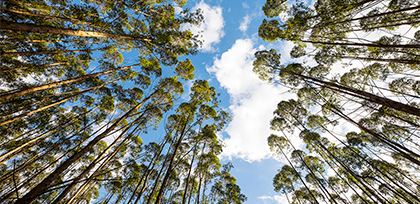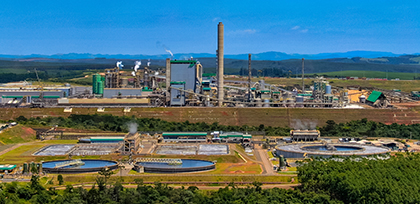Emissions management
Decarbonization strategy
Action focused on climate resilience is directly linked to building a low-carbon society. Klabin has a consistent strategy for reducing carbon emissions, which includes initiatives focused on energy efficiency and replacing the use of fossil fuels with renewable sources.
The biomass gasification plant is an example of low carbon technology that increases the Company's energy matrix with fuel generated from wood biomass.
Emissions inventory
created in 2008, it is responsible for adapting the GHG Protocol method to the Brazilian context and for developing calculation tools for greenhouse gas emission estimates.
GlossárioScope 1 |
Scope 2 |
Scope 3 |
|---|---|---|
Direct GHG emissions from sources that belong to or are controlled by the organization. |
Indirect GHG emissions, by the acquisition of electric and thermal energy consumed by the company. Since 2019, Klabin considers the methodology based on the choice of purchase in its results. |
Other indirect GHG emissions, which are a consequence of the company's activities, but occur in sources that do not belong to or are not controlled by the Company. |
Within scope 3, the Company conducted a new study to identify and calculate GHG emissions for all categories relevant to its business. As a result, Klabin is expanding its Scope 3 emissions by adding two new categories – processing of products sold and end-of-life treatment – and is in the process of updating the accounting for the categories of goods and services purchased and activities related to fuels and energy not included in Scopes 1 and 2. The new results will be updated in the Company's reports throughout 2023.
Partners in reducing CO2 emissions
Klabin is striving to reduce its carbon footprint through projects that generate carbon credits. One of the projects underway is linked to the Plante com a Klabin program, a partnership with rural producers that will increase the supply of wood for the Company's expansion plans.
In this partnership with rural producers, carbon credits will be generated upon proof of positive conversion of land use change. For partners who wish to participate, Klabin identifies potential areas for reforestation of commercial forests or degraded areas on their properties that need to be restored, supports land use changes such as pastures, facilitates reforestation or restoration of native forests, and assisting producers in the verification process of actions. The carbon credits generated and certified, when traded, will have their revenue shared equally between the Company and the producer, the latter being entitled to a guaranteed minimum amount.
Learn more at:
Evolution of the renewable energy matrix
Klabin ended 2022 with a greater contribution of renewable sources to its energy matrix: 90.9% The 2030 target is to have 92% of the energy matrix from renewable fuels.
The production of energy from biomass and black liquor has been a driving force behind the advancement of this indicator. Other projects also contribute to the attainment of goals related to controlling pollutant emissions and utilizing clean energy.
raw vegetable oil (crude) – unrefined – produced after the acidulation of the black liquor soap (extracted from pine) present in the chemical recovery process of the pulp and paper industries. Because it is a renewable forest-based oil, this ingredient can replace other petroleum bases, making its applications more sustainable.
Glossárioa black liquid obtained through the pyrolysis process, in which biomass is subjected to high temperatures in an isolated environment with little or no oxygen. It is mainly used as a fuel for heating and the generation of electrical energy.
GlossárioIn 2022, Klabin produced a total of 2.9 million MWh of electricity in its operations. Of this total, 729,000 MWh, generated from the use of renewable fuels, were made available to the SIN by the Puma Unit, contributing to a more renewable national energy matrix.
Considering all of the Company's units, 82% of the electricity consumed comes from own generation. In 2022, 100% of the electricity purchased by the Company came from renewable sources, verified through the acquisition of renewable energy certificates (IRECs) and self-declarations, surpassing the KSDG target set for 2030 to purchase certified energy from renewable sources.
Own generation of electricity
At Klabin, the pulp and paper mills are energy generators. The Puma Unit in Paraná is self-sufficient and any excess is sold and made available to the National Interconnected System (SIN), which manages the production and distribution of electricity throughout the country.
In 2022, 729,784 MWh were delivered to the SIN by the Puma Unit, accounting for 25% of the total electricity produced by Klabin.
The Monte Alegre Unit, in Paraná, is the second largest producer of electricity for Klabin, providing approximately 50% of the energy that the factory requires. Considering all of the company's units, 82% of the energy consumed comes from own generation.
3.5 million Mh - total electricity consumed in 2022
Electric trucks
To engage the supply chain in promoting a low-carbon economy, Klabin launched a pilot project in December 2022 to operate electric trucks at the Jundiaí Tijuco Preto Unit in the interior of São Paulo. In this first stage, four trucks are in the testing phase to make deliveries in the state of São Paulo. They are recharged at the charging stations installed in the unit. The project, implemented in partnership with LOG Group, Klabin's logistics solutions provider, is part of the Company's efforts to reduce Scope 3 greenhouse gas (GHG) emissions, which cover, among others, the transportation and distribution of products and are one of the greatest challenges of decarbonization.











